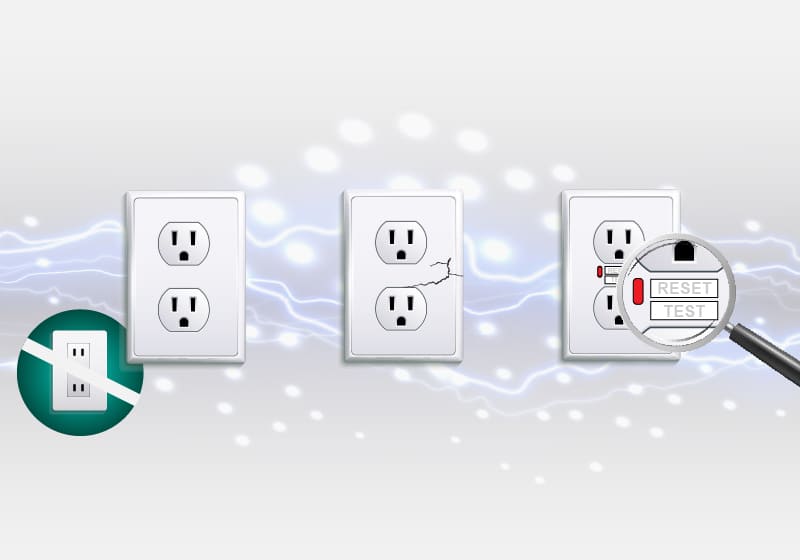Your house has hundreds of different components that constantly need to be monitored and serviced. From your HVAC to your dishwasher, it can be hard to stay on top of everything. The electrical system in your home is just one of these many pieces that could end up costing you if left unchecked.
Loose Outlets
A loose wall outlet may seem like a minor annoyance, but it can quickly turn into a serious problem. Years of constantly using an outlet can wear it down, causing whatever you plug into it to slip out. When a plug isn’t secure, it causes the connection to arc in your wall. This then creates a spark that can either shock you or start a fire within your home. The good news is that old outlets can be repaired easily and fairly inexpensively.
Cracked or Missing Covers
Missing or cracked outlet covers are more than just a cosmetic concern. Pets or young children that get too close can be injured from a powerful shock. An exposed outlet also means that the wiring and box behind aren’t protected, allowing the box to move around freely and sever the surrounding wires. Replacing a cover is another simple repair, and it’s also one to take care of quickly to prevent any safety issues.
Power Surges
A surge in your home can have several causes, like a lightning strike or even overloading an outlet. Older homes are especially susceptible to power surges if they haven’t been recently updated. While it’s possible to resolve a surging problem yourself, it’s best to get it looked at by a professional. An inspector will check your wiring and any connected devices to come up with the best solution.
Flickering or Dim Lights
Flickering and dim lights can be a side effect of frequent power surges, but there are other causes to consider, like a loose bulb in a lamp or ceiling light. Check that all your lights are screwed in tightly and that they’re the correct wattage for the fixture. If you’re still experiencing a problem, it could be from frayed or corroded wires. This is another instance where it’s best to call for backup as soon as possible.
Overloaded Plugs
Trying to get as many electronics as possible hooked to one outlet is a common, but unsafe habit among homeowners. You run the risk of not just ruining your home’s wiring, but also those expensive electronics as well. Although surge protectors and plug adapters can lessen your chances of this happening, you should still take additional steps. Spread out your devices between multiple outlets to evenly distribute their usage and keep your gadgets out of danger.
Incorrect Outlets
Not all outlets are created equal, and one place that can come into play is your bathroom. Specialized ground-fault circuit interrupters or GFCIs are designed to quickly shut off power to an outlet if something goes wrong, like water getting inside. GFCIs are recommended for bathrooms and kitchens, but should also be used in places where there’s a high chance of water intrusion such as a basement, garage, shed or any exterior outlets.
Extreme Usage
A high bill at the end of the month can serve as an eye-opener for you to finally upgrade and fix your system. Swap out older fixtures and bulbs for more energy-efficient ones to cut down your usage. While it might be expensive to redo your home’s wiring, it should be at the top of your list if you frequently have issues. Not only will you save money in the long run, you’ll also help protect yourself and your home from an electrical emergency.
Make sure your electrical system is safe with an NPI home inspection.
Our NPI inspectors have the knowledge and expertise to assess your home’s major systems and provide a full report. Find an inspector near you today to buy or sell with confidence. Check out the infographic below to see what NPI inspectors look for in your electrical systems.



